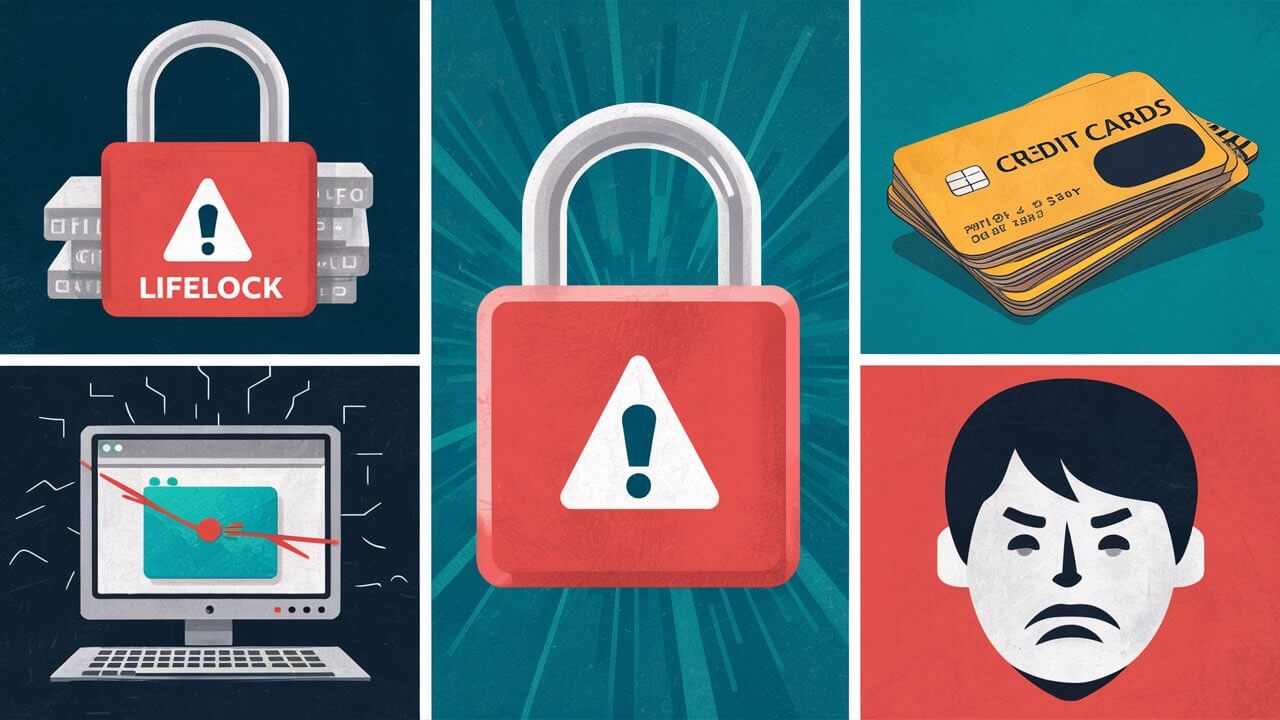
With the advancement of technology, identity theft has become a significant issue that affects a lot of consumers in the present time. Given the fact that people’s personal information is leaked on the internet regularly, it is not surprising that such services that can shield you from identity theft are something people might be interested in. Among the most well-known companies operating in this industry, is LifeLock.
This company was established in 2005, and it claims to be an identity theft protection company through offers protection of your details. It boasts of having advanced monitoring technologies and alert features that track any activities that are linked to your identity. But, although LifeLock does offer some useful functions and features, consumers should know about the following disadvantages as well.
How LifeLock Works
It is important to first know what LifeLock does as a company in the identity theft protection sector to clearly outline the disadvantages that come with using this company’s services.
Some of the details you have to reveal to LifeLock at the beginning of your subscription include your SSN, birth date, address, and many others. LifeLock then uses this info to track your credit reports, bank statements, credit card statements, etc., for signs of fraudulent transactions.
In case of anything suspicious, LifeLock alerts its customers through a phone call, email, or text message. They have agents that can assist in determining whether the real case of identity theft or fraud is present or not. If so, LifeLock actively helps in such matters as identity restoration, for example, in fixing fraudulent charges, correcting the information with credit bureaus, recovering lost money, and establishing credit monitoring.
The main services that LifeLock offers include; monitoring your identity, giving you notice when there is any activity on your identity, and if you become an identity theft victim while still subscribed to them, they handle the whole process of recovery. Nevertheless, consumers should be aware of the following major disadvantages of using LifeLock as their identity theft protection provider.
Separate from the scams, rip-offs, and identity theft protection that LifeLock can offer, there are also certain drawbacks and negative aspects that may come with the service.
Here are some of the major disadvantages and downsides to using LifeLock for identity theft protection: Here are some of the major disadvantages and downsides to using LifeLock for identity theft protection:
1. High Monthly Fees
The product under consideration is the LifeLock identity theft protection service which is regarded to be one of the most costly ones in the industry. Depending on the plan they are currently offering, they go for as low as $9. 99 for the basic plan while to gain full monitoring and services, you need to go for the $29. 99 or even more. Taking into account that most sign up for an extended period of protection and not just for one month, the costs are ratcheted up.
2. Multiple Class Action Lawsuits
As for LifeLock, it says that it shields your identity and personal info but it has been involved in numerous class action suits for false advertisement and not adequately protecting customer’s information. For instance, LifeLock in 2015 having faced Federal Trade Commission charges had to part with $100 million after being accused of lack of ability to provide the services that it was offering to its subscribers.
3. Breaches of Customer Data
Similar to the class action lawsuits, LifeLock has suffered from breaches of customer data in the past years. In some cases, hackers even gained customers' email addresses and phone numbers among other information. Though this is not what we can exactly refer to as a full identity theft level breach, it means your personal information is not as secure as many Lifelock customers fondly believe.
1. It is, however, important to note that the current methods of Dark Web Monitoring have some limitations.
In this aspect, the product sold by LifeLock primarily involves the scanning of the dark web for instances where customers’ details are being sold by hackers. However, the monitoring of the dark web is still not as vast as people might expect. Some stolen records are not resold in the black markets and hence not traded publicly. Therefore, though monitoring the dark web is helpful, it has major shortcomings in shielding your identity.
2. Alert Fatigue
Since LifeLock monitors so much, it sometimes sends numerous notices to its clients, yet a very low proportion indicates fraud as compared to general notifications. At the end of weeks and months, customers switch off from fraud alerts as they become a normal way of life. If you get numerous alerts then you tend to think every notification is just that – nothing of any real value. However, this mentality is a disservice since it eliminates the real possibility of identifying identity theft.
3. It is however seen that they remain susceptible to many more types of ID theft.
Even if it can be said that LifeLock has rather advanced monitoring features, it is still critical to understand that you remain rather exposed to many forms of identity theft. Even if you do all the above measures, anyone who gets hold of your debit card coupled with the PIN will clean all your balances. Once one can get hold of your Social Security number, for instance, one can open new fraudulent credit cards which consumer reporting agencies cannot always forestall in time to avoid a loss.
Furthermore, none of LifeLock’s services will also shield you from true name or medical identity theft cases. A criminal can still use your stolen information when applying for medical facilities and then provide the police with fake information during an arrest. As mentioned earlier, LifeLock offers no solutions to preventing these forms of identity theft.
Are the costs of LifeLock too high and can it protect you from identity theft?
Taking into account these considerable disadvantages and deficiencies in insurance, prospective customers of LifeLock should assess whether the services are of the value of the prices which can go beyond $500 per year, particularly for families, who would like to be insured comprehensively. Of course, there are some services that LifeLock may offer, such as alert conveniences and time-saving help in cases of identity theft However, the above disadvantages tell you that you will remain rather exposed even if you have LifeLock protecting your accounts.
Finally, keeping your eye on the ball and safeguarding your credit reports, bank statements, and other records on your own, with the use of credit file freezes, and employing sound identity theft prevention measures that include leaving your SSN at home and not carrying it in your wallet offers a great deal of protection at either no cost or at a relatively low cost.
Before going out and spending hundreds of dollars a year to LifeLock for identity theft protection services, objectively contemplate upon whether the offered conveniences and help with the recovery are worth the prices, legal actions, and the remaining holes in the protection. While LifeLock monitoring and recovery sounds appealing many people can reduce their risk of identity theft by following simple steps.
Call now for expert credit repair services: (888) 803-7889
Read More:
Is it safe to give out the last 4 digits of SSN?
Does Experian have a monthly fee?
What is a good credit score to buy a car?
What is an acceptable Experian credit score?
Do banks consider Experian credit score?
Read More:
How much credit card debt does the average American carry each year?
Can I buy a house with a 608-credit score?
Can I buy a house with a 602-credit score?
Can I buy a house with a 628-credit score?
Do banks offer credit monitoring services?




